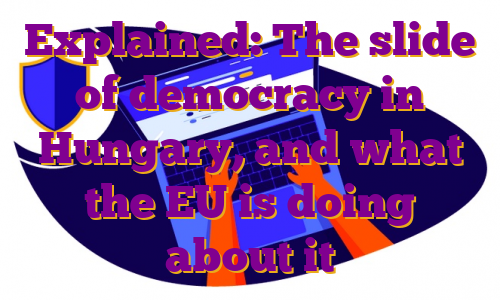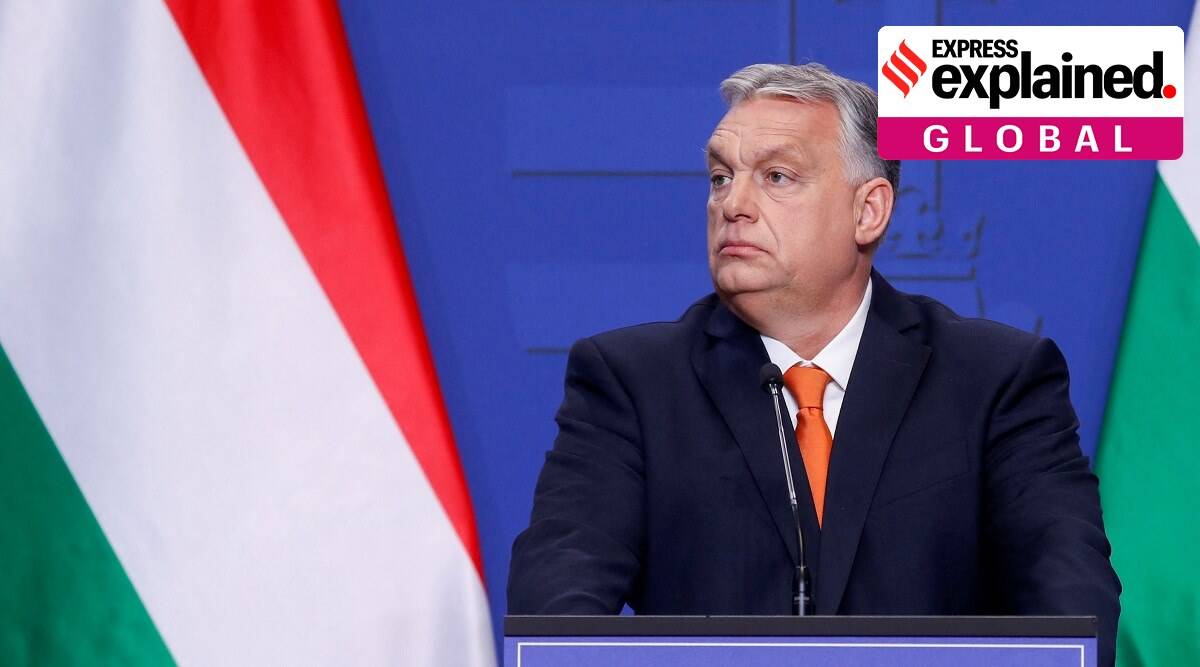Viktor Orban, Hungary’s pro-Putin nationalist leader, won his fourth consecutive term, in the recently-held elections, which independent observers deemed free but not fair. Since then, the European Commission has launched a powerful mechanism that could potentially cut Hungary’s funding for breaching the rule of law.
The move comes in the backdrop of charges of corruption, and declining democracy in the landlocked central European country. Orban, a staunch far-right popular leader who has been at the helm since 2010, apart from his previous stints as the Prime Minister, came under intense scrutiny following his post-election speech. Orban not only called out the “bureaucrats” at Brussels, the administrative centre of the European Union, but also termed Ukrainian President Volodymyr Zelenskyy as his “opponent”, laying bare his closeness to Russia.
🗞️ Subscribe Now: Get Express Premium to access the best Election reporting and analysis 🗞️
Why is Orban a controversial leader, and what is the EU doing about it? We explain.
A history of ‘illiberal’ governance
In a speech in 2018, Orban declared that ‘Christian democracy’ in Hungary “is by definition, not liberal”. “…it is, if you like, illiberal,” Orban said, adding that it differed from liberal democracy in three issues: “Liberal democracy is in favour of multiculturalism, while Christian democracy gives priority to Christian culture. Liberal democracy is pro-immigration, while Christian democracy is anti-immigration. And liberal democracy sides with adaptable family models, while Christian democracy rests on the foundations of the Christian family model.”
Orban’s anti-immigration stance, especially against Muslims from Middle-Eastern countries seeking asylum, has long troubled the European Union. In 2015, Reuters quoted him as saying, “We do not want to see a significant minority among ourselves that has different cultural characteristics and background. We would like to keep Hungary as Hungary”. In 2021, he went against European Law, criminalising lawyers and activists who help asylum seekers.
The US Freedom House has termed Hungary as “partly free”, the only EU member state to be ranked as such.

 File photo of Hungarian Prime Minister Viktor Orban, left, with Jaroslaw Kaczynski, center, the leader of Poland’s ruling party, Law and Justice, and Polish Prime Minister Mateusz Morawiecki, during the inauguration of a memorial for the Smolensk plane crash, in Budapest. (AP)
File photo of Hungarian Prime Minister Viktor Orban, left, with Jaroslaw Kaczynski, center, the leader of Poland’s ruling party, Law and Justice, and Polish Prime Minister Mateusz Morawiecki, during the inauguration of a memorial for the Smolensk plane crash, in Budapest. (AP)
In a February 2022 report, the Human Rights Watch flagged renewed pressure over the LGBTQ+ community in Hungary, following an overturning of a ruling that held comparing LGBTQ+ members to paedophiles in the media as unfounded and offensive.
This followed a series of laws that sought to curb the freedom of the queer community. In 2020, the Hungarian Parliament passed a law making it impossible for trans and intersex people to legally identify as their preferred gender. It has also amended the definition of ‘family’ in its Constitution, effectively banning same-sex couples from adopting children. Further, a Hungarian law forbids exposing children to content around homosexuality.
Orban’s nationalist party, Fidesz, has also been called out for its hegemony over the media. The 2021 World Press Freedom Index ranks Hungary at 92, down from its 23rd position in 2010 when Orban came to power.
In a 2021 speech, Orban claimed that the government had increased its ownership to 55 per cent of local media. In fact, according to Atlatszo, a media watchdog and a member of the Global Investigative Journalism Network, in 2018, over 500 media outlets were owned by persons linked to the government and served as mouthpieces of Fidesz. Of these, only 31 outlets were pro-government in 2015.
Over the years, concerns have also been raised over the independence of the judiciary as well as corruption in the Orban government. The European Commission, in 2021, sent a letter to Budapest describing irregularities in its withdrawals from the EU Budget and questioning the excessive powers given to the President of the National Office for the Judiciary, Politico has reported.
Adding to the infringement cases raised against Hungary, the Commission in April 2022 pointed out the lack of transparency in its public procurement.
How has Hungary responded to the war in Ukraine?
Budapest’s stance on the Russian invasion of Ukraine is driving another wedge between the EU and Hungary, which is also a member of the North Atlantic Treaty Organisation (NATO). Orban, during his election campaign, maintained that Hungary should remain neutral and not cut off its economic ties with Russia.
“This isn’t our war, we have to stay out of it,” Orban said, adding that supplying weapons to Ukraine could make it a target for Russia. “We condemn the Russian attack, but we cannot help the Ukrainians without simultaneously destroying ourselves,” he said on April 1, according to a statement provided by the Prime Minister’s Office.
The nationalist leader after coming to power has also said that Budapest would be willing to pay for Russian gas in Roubles – contradicting the EU’s call for a united front against Moscow’s threat to cut off gas supplies if not paid in its currency. While Orban has supported sanctions against Moscow, he has reportedly refused to back any sanctions on energy as Hungary depends heavily on Russian imports.
According to data provided by The Observatory of Economic Complexity (OEC), in 2020, Russia was the largest importer of crude petroleum and petroleum gas in Hungary. It accounted for 57.2 per cent of Hungary’s imported crude petroleum ($1.05 billion) and 37.3 per cent of imported petroleum gas ($536 million). Overall, Hungary’s trade with Russia included $2.15 billion of imports.
Ukraine, however, has criticised Budapest’s stance saying that paying for Russian gas would “create additional sources of funding for Russia’s military machine.” The Ukrainian Foreign Minister called upon Orban to stop undermining the unity of the EU, Reuters reported. Hungary, however, has called Kyiv’s statements “insulting” to its people.
How is the EU looking to penalise Hungary?
The European Commission has already withheld Covid recovery funds earmarked for Hungary citing corruption, and for Poland, expressing concerns over the independence of the judiciary. Proceedings under ‘Article 7’ of the Treaty on EU were initiated against the two countries in 2018, which can revoke the voting rights of a member state for not complying with EU laws. However, as the unanimity of all member states is needed to suspend these rights, Poland and Hungary’s ties can potentially lead to them using their veto powers in favour of each other.
On April 5, the Commission’s President Ursula von der Leyen told the European Parliament, that the new Rule of Law Conditionality Mechanism has been launched against Hungary. The mechanism came into force in January 2021, and Hungary is the first country against which procedures have been initiated. Budapest, consequently, stands to lose its funding from the EU after the Council makes a decision over its breaches of the rule of law.
The conditionality mechanism, however, has not yet been deployed against Poland. With Warsaw playing a pivotal role in the Russia-Ukraine war, and its criticism of Hungary’s neutral stance, the Commission’s move could further separate the two countries. von der Leyen also indicated that they were “close” to releasing the pandemic-recovery funds to Poland, as soon as it fulfils the criteria laid out by the EU Court of Justice for ensuring an independent judiciary.
Hungarian ministers have criticised the Commission’s decision, with Orban’s chief of staff saying that the EU was punishing Hungarian voters for exercising their franchise.
If blocked from EU cash, the Hungarian economy will take a severe hit. A Bloomberg report states that EU funds made up more than 10 per cent of Hungary’s budget revenue in 2020. Now, it stands to lose a part or all of the nearly 36 billion Euros (based on current prices) that the EU has allocated for Hungary for the period 2021-27 apart from the already withheld Covid-recovery fund of 7.2 billion Euros.
!function(f,b,e,v,n,t,s)
{if(f.fbq)return;n=f.fbq=function(){n.callMethod?
n.callMethod.apply(n,arguments):n.queue.push(arguments)};
if(!f._fbq)f._fbq=n;n.push=n;n.loaded=!0;n.version=’2.0′;
n.queue=[];t=b.createElement(e);t.async=!0;
t.src=v;s=b.getElementsByTagName(e)[0];
s.parentNode.insertBefore(t,s)}(window, document,’script’,
‘https://connect.facebook.net/en_US/fbevents.js’);
fbq(‘init’, ‘444470064056909’);
fbq(‘track’, ‘PageView’);
.


